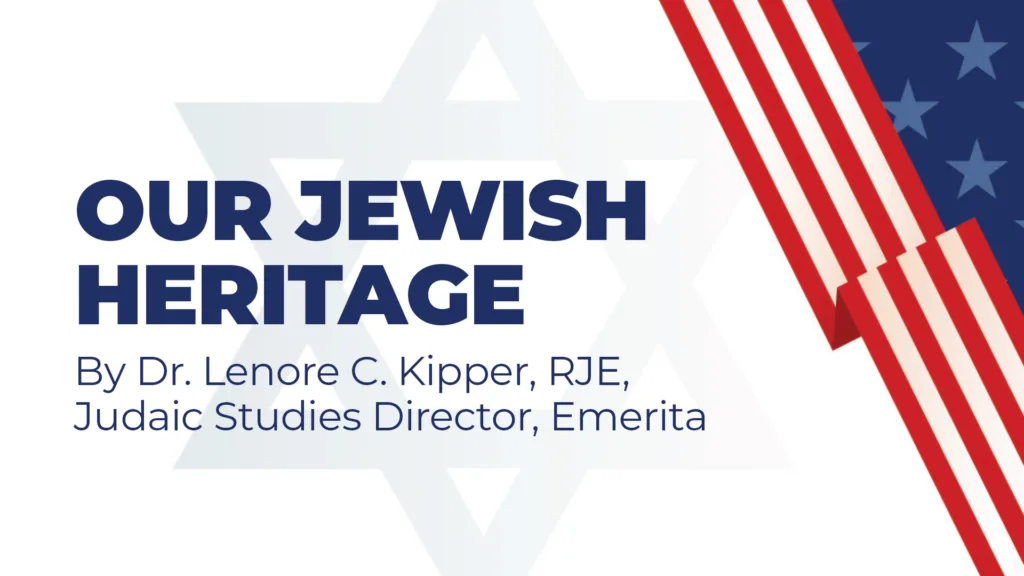Challenges and Changes: The American Jewish Journey
Accomplishments and Dilemmas
As we reflect over the past hundred years, there are so many areas of progress and growth in the American Jewish Community. The rise of synagogues in the suburbs, the establishment of Israel and our connection, the acceptance and integration of Jews in business, education, government, medicine, law, science and so much more, have created a community that has gained in stature in the eyes of Americans, and developed an era of affluence that has supported many philanthropic causes, Jewish and secular. Yet, the ongoing dilemmas are still with us. There is more assimilation, drifting or fading away from the Jewish community, more intermarriage, lower birth rate, smaller proportion of the total population, more dispersed throughout the U.S., little differences between Jews and non-Jews.
The open society and acceptance, the further away from the immigrant generation has brought about positives and negatives. Some Jews will vanish and disappear into the more secular world. Others will more consciously affirm their Jewishness through their synagogues, the organized Jewish community and through Israel connections. The majority of Jews are balancing how to live within the mainstream of American life and Within a Jewish community. Many do not deny their Jewishness, but they do not choose to affiliate. For those who care, they have to make the extra effort to affirm Jewish identity, through Day Schools, Camps, trips to Israel, synagogue affiliation.
Jonathan Sama observations
Jonathan Sarna, in his book, American Judaism, 2004, and in more recent articles, observes the following: our population numbers are declining, there is little new Jewish immigration, there is little conversion, but higher rates of interfaith, inter-ethnic marriages, and a low birthrate. He quotes several studies that tell us that 1,325,000 individuals, whose grandparents were Jewish, now practice other religions or no religion. Another study says that 2,345,000 children of mixed marriages now identify themselves as Christians or no religion. These are indicators that are of great concern. He also comments that as the rate of intermarriage rises, the idea of Jewish Peoplehood declines.
Challenges
Sama suggests several challenges to consider. What are the boundaries? Who is counted in and who is counted out? He suggests that we are in a trans-denominational Judaism or post denominational. Reform and Conservative synagogues are blending in several communities. On the other hand, Reform Judaism excluded a synagogue because it openly declared God was not part of their Judaism- There is the question of authority and leadership. Who speaks for the American Jewish Community? The contemporary culture in the U.S. is affecting Jewish life; gender equality, personal autonomy, gay rights, openness and acceptance of intermarriage, Christmas/Easter dilemmas, how to balance American cultural influence and Jewish religious teaching. When do we compromise, when do we need to stand firm? There are some serious divisions within Judaism between the Orthodox and the Liberal views (also in Israel). Will we see Jew verses Jew, a people divided, the bifurcation of Jewry (as we did at the fall of Jerusalem in 70 CE)?
Where shall we direct our efforts? On the quality of our Jewishness, to deepen and enhance the committed core, the saving remnant? Or should we focus on quantity, to increase our numbers through outreach to non-Jews? The strength of American Judaism has always been in trying, testing, experimenting and innovating. Collectively, the American Jewish Community has reached the highest economic, educational, social level in history, and the highest degree of freedom. What is our future destiny? We are the largest and most influential community in the Diaspora. Many of the Jewish ideals, traditions and customs that were brought over from Europe, have been redefined, expanded and made relevant to our changing circumstances. At the same time, our relationship with Israel has made it vital for the two communities to keep our connections, learn from each other, and realize that our destinies are intertwined.
Questions for the Future
How can we sustain and secure the Jewish future in the Diaspora, in the U.S. and in Israel?
How can we make Judaism relevant to the lives of American Jews so that each generation keeps the connection, I’dor vador? What are our responsibilities within our own community and to all of the Jewish People?
There is no question that the challenges that the Jewish People have overcome in the past, made us strong and committed. When we review Jewish history there is a sense of awe about the miracle of Jewish survival. What has enabled the Jewish People to endure has been rooted in the experiences of Jewish history and a commitment to the ideas of God, Torah and Israel. There has always been a “saving remnant” in each generation that has found new ways to renew Judaism. As long as we keep reflecting and evaluating, asking questions, I believe we will come forth with a renewed vision that will give us hope and optimism for the future.
“Where there is no vision, the people perish.”
Proverbs 28:18
L’shalom, Lenore
From the TBAM Archives, Highlights from the 2003 Commentators
- Announcing the new Membership Directory for 2003; Honoring Rabbi Bookman, Lenore Kipper, and Bill Sussman. The theme is Arevut, Responsibility and Commitment.
- The Daty School Reports from The Leadership Team, Dana Zarr, Elementary School, Lyn Zuckerman, Pre-School, Lenore Kipper, Judaic Studies.
- Dr. Abraham Gittelson, from CAJE, presents a lesson on Judaism and Islam from a Jewish Perspective.
- The Institute of Jewish Studies Classes begins with the following teachers: Rabbi Bookman-God in the Movies, Rabbi Morris Kipper-Divided Jerusalem, Rabbi Haskell Bernat-Jewish Law Continues, Lenore Kipper- Adult B’nai Mitzvah.
- Shabbat Alive! Concert with Rick Recht.
- An Evening with Rabbi Harold Kushner. His lesson on Three Ideas Judaism can Teach the World.
- Talmud Torah Award to Paul Distenfeld and Anabela Moskowitz for their lifelong commitment to learning.
